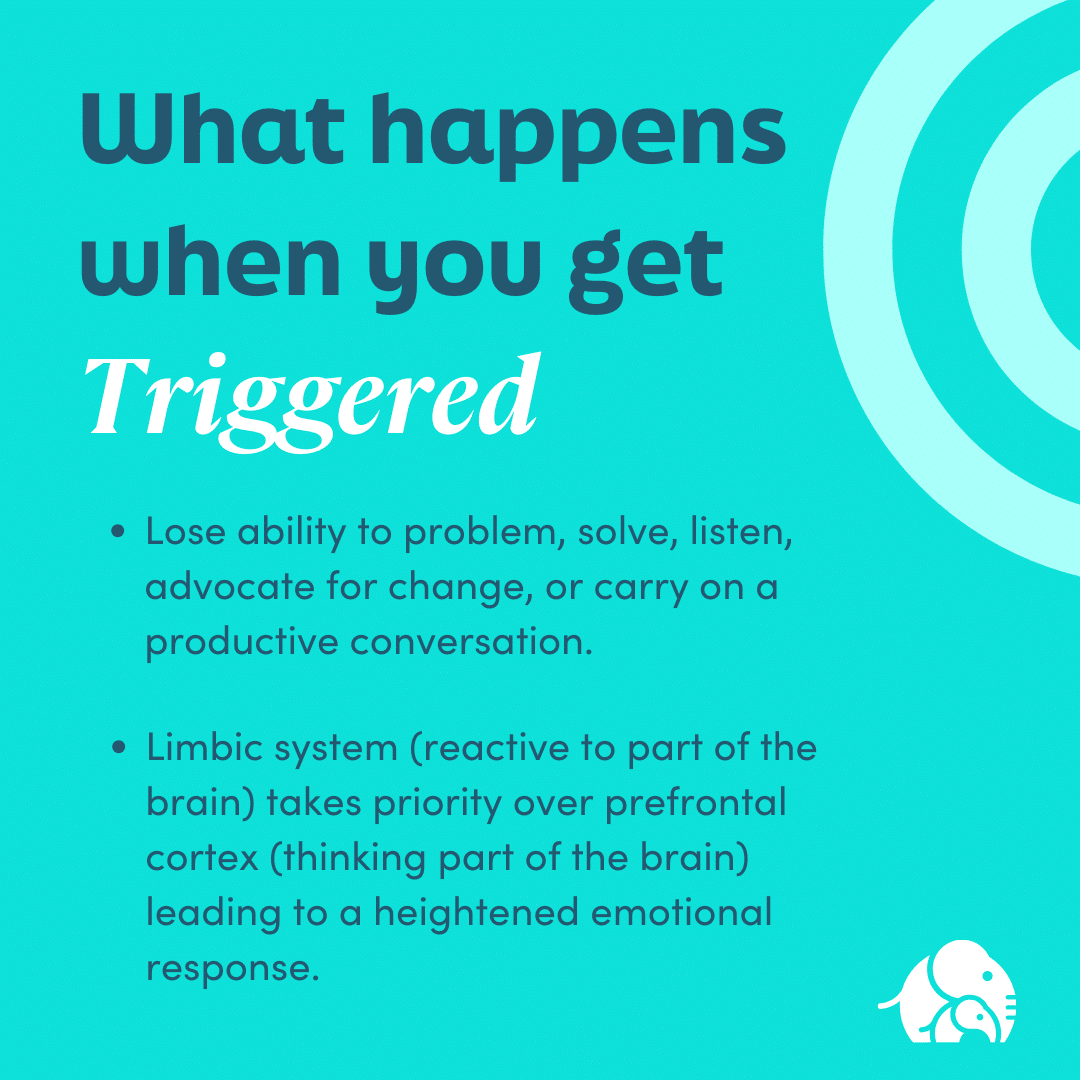Unless you spend an average of zero minutes per day on social media, you’ve no doubt come across the word “trigger.” For the most part, I consider this to be a good thing. After all, it means lots of people are talking about mental health, including how negative events from our past can impact our emotional experiences in the now. Yay, mental health awareness!
That being said, when complex psychological concepts weave their way into mainstream culture, their original meaning can get lost in the hullabaloo, and “triggers” are no exception. As our society becomes more comfortable talking about trauma, I think it’s important to understand what triggers are, how and why we get them, and what we can do to manage them when they show up.
Want to learn more? Contact Ellie Mental Health and get connected with a therapist who matches your needs today.
What Are Triggers?
Triggers are anything (a sound, a smell, a place, or even a situation) that brings up a strong emotional reaction tied to past experiences. For people who have experienced trauma, triggers can make it feel like the past is happening all over again, leading to anxiety, panic, or shutting down. Learning to recognize triggers is an important part of healing because it helps people build awareness, develop coping strategies, and regain a sense of control over their emotions.
What Does It Mean to Be Triggered?
When we are triggered, we lose our capacity for rational thought. Our prefrontal cortex (the thinking part of the brain) gets hijacked by our limbic system (the reacting part of the brain) and blocks our ability to effectively problem-solve, listen, advocate for change, or carry on a productive conversation (note: if you are in actual danger, you haven’t been triggered; your limbic system is simply doing its job, which is to keep you safe.)
The Relationship Between Trauma and Triggers
Triggers do not exist in the absence of trauma. So, to understand triggers, you first need to know a little bit about trauma.
For better or for worse, trauma happens to all of us at some point. Not only is trauma inevitable, but it also teaches us how to survive, which is probably why we are wired to react more strongly to the bad stuff that happens to us than we are to the good stuff.
Broadly speaking, here’s how trauma impacts us most of the time: The bad thing (i.e., traumatic event) happens, we have a big negative emotional response, and then once that bad thing is over, the brain processes the experience, gleans the lessons that can be learned from it, and then files it away into our long-term memory. This is what I call Wisdom. It’s why your thrice-divorced grandma is able to give you excellent relationship advice.
Sometimes, however, a bad thing happens to us, we react, the bad thing ends…but we are prevented from processing the experience and learning from it. This can happen for a variety of reasons, some more complex than others. For now, suffice it to say that the bad thing and the big negative emotional response sorta get frozen in time and stored together in the limbic system, becoming unprocessed trauma, or what I call Baggage. Baggage is why my grandma, who was a child during the Great Depression, would furtively stuff leftover pork chops into her purse when we went out to eat, despite having a fully stocked pantry at home.
The Fallout from Unprocessed Trauma
Ok, so here you are today, with your Wisdom and your Baggage. Sometimes, negative things happen to you, and while you may have some lingering feelings about it, you are able to reach back into your storehouse of wisdom, grab the lessons you have learned from similar experiences in your past, and make your next move accordingly.
Once in a while, however, you may encounter a situation that falls into the Baggage category, and it sends you into an emotional tailspin. In fact, you feel just like you did the very first time something similarly awful happened to you. You may even be aware that your response is totally outsized, given the actual situation, but it doesn’t stop you from freaking out anyway. The reason for this? You have been triggered.
In other words, your triggers are located inside your Baggage.
Types of Triggers
Triggers are deeply personal and can vary widely from person to person based on their experiences and sensitivities. Some triggers are external, like a specific smell, a loud noise, or a familiar location, while others are internal, such as certain thoughts, emotions, or physical sensations. What feels neutral to one person might be overwhelming to another, making it important to recognize individual patterns. Understanding these differences helps people develop personalized coping strategies and regain control over their responses.
Examples of Internal Triggers
Internal triggers come from within, and they are often linked to thoughts or emotions that unconsciously activate unresolved trauma. Since these triggers are internal, they can be harder to identify and may seem to come out of nowhere.
For example, someone who experienced a past abusive relationship might feel an unexpected wave of panic after experiencing a moment of self-doubt or criticism. Even if nothing in their environment is threatening, the familiar feeling of inadequacy may unconsciously resurface memories of past emotional harm. Without recognizing the trigger, they may spiral into distress, reinforcing the emotional pattern. Learning to identify and address internal triggers:
- Fear
- Anxiety
- Stress
- Physical or emotional pain
- Intrusive thoughts
- Loneliness
- Abandonment
Examples of External Triggers
External triggers come from the outside world and can include specific sights, sounds, smells, places, or even people that unconsciously activate unresolved trauma. These triggers are often tied to past experiences, making the brain react as if the original event is happening again. Because they’re connected to the environment, external triggers can feel sudden and overwhelming, sometimes catching a person off guard.
For example, someone who was in a car accident might feel a surge of panic when hearing screeching tires, even if they are safe in a parking lot. Their body instinctively reacts to the sound, triggering memories of the crash and the fear they felt in that moment. Without realizing they’ve been triggered, they may experience a racing heart, shallow breathing, or an urge to escape. Recognizing external triggers can help you develop strategies to manage your responses and regain a sense of control.
- Sights
- Sounds
- Smells
- Anniversaries
- News stories
- Music
- Situations
How to Identify Triggers
So how do you know if you’ve been triggered, or if you’re just upset? First and foremost, you need to determine if your emotional response was disproportionate to the situation. For example, it is perfectly reasonable to get upset at someone for making fun of your shoes. But if you take your shoes off and hurtle them at the person’s head, along with every offensive word you can think of, I think we can agree that is a disproportionate emotional response, and it could be a sign that somewhere in the past you have some unprocessed trauma.
To be very clear: getting super upset does not, in and of itself, mean you have been triggered. For example, if you are a woman or person of color, no doubt you’ve been told more than once you are overreacting to a situation simply because you had a stronger reaction than the people around you. It should go without saying that a person of color would probably have a bigger emotional response to a racist remark than a white person would. A woman may have a more negative reaction to a misogynist joke than the men in the room. That does not mean they have been triggered. But if the woman responded to the misogynist joke by setting fire to the joke-teller’s car, that’s your clue she may have been triggered.

How to Deal with Triggers From Trauma
The bottom line is that while you are not responsible for the trauma that happened to you, you are the only one who can do anything about it.
Now for the good news: You can do something about your triggers! You are not at the whim of the people around you! Huzzah!
One way to help manage your trauma-related triggers is through mood tracking or journaling. There are also several widely used therapeutic interventions to help manage trauma triggers, all of which have a sizable body of research supporting their effectiveness. EMDR, Adaptive Internal Relational Network (AIR) Therapy, Brainspotting, and Trauma-Focused CBT are a few of the most widely used interventions that have a sizable body of research supporting their effectiveness. These tools and therapies can help to get to the root of the issue and get you to feel some relief.
Want to learn more? Contact Ellie Mental Health and get connected with a therapist trained in any of the above modalities.


